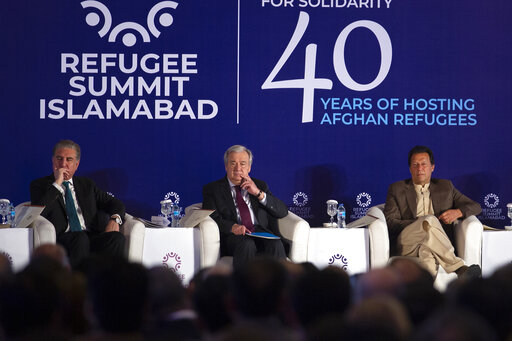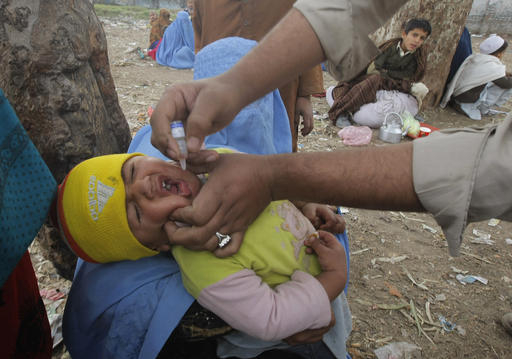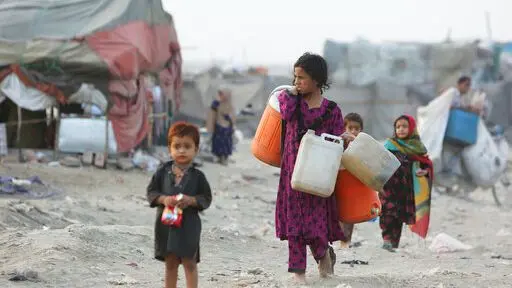When boatloads of refugees from Africa and the Middle East head to Europe, everybody takes notice.
The image that's presented by media outlets around the globe is that of the poor invading rich countries.
But the reality is that most refugees travel to countries neighboring their own. Quietly and out of the spotlight, these poor neighbors carry a burden that's well beyond their means.
Take Pakistan as an example.
For four decades, it has been home to millions of displaced persons from Afghanistan whose strategic location in Asia has made it a focal point of imperialist ambitions and, therefore, susceptible to foreign invasion.
Those decades of armed conflict, latterly involving the United States, have driven those millions across the border to Pakistan as well as Iran, who together account for 90 percent of Afghan refugees worldwide.
'Global community must do more'
Since 1979, when the Soviet-Afghan War began, Pakistan has regularly been one theworld's top refugee-hosting countries,United Nations figures show. It is currently at number two.

U.N. Secretary-General Antonio Guterres, center, attends the Refugee Summit with Pakistani Foreign Minister Shah Mahmood Qureshi and Prime Minister Imran Khan, right, in Islamabad, Pakistan, Monday, Feb. 17, 2020. (AP Photo)
This week, the South Asian nation is hosting a conference in Islamabad ostensibly to mark 40 years of Afghans living as refugees in the country – one of the most protracted displacements in modern times. But the meeting is also taking place at a time when peace in the area has become an enticing prospect, raising all sorts of questions about the future of an army of frustrated exiles.
UN Secretary-General Antonio Guterres, who is attending the conference, told his hosts in a speech: "We must recognize that international support for Pakistan has been minimal compared to your own national efforts." Later, he told reporters: "It's time for the international community to assume its responsibilities and to support Pakistan very meaningfully."
The office of the UN High Commissioner for Refugees (UNHCR) said Pakistan is home to an estimated 3 million Afghans, 1.4 million of whom are documented.
Just imagine the pressure this places on the host nation, which is in the midst of a three-year, 6-billion-dollar economic stabilization program with the International Monetary Fund – the latest of more than 20 IMF bailout packages it has received over the decades.
Pakistan 'a model of good practice'
Still, according to the UN, Pakistan, despite the huge financial challenges it has faced, has afforded its guests access to local services including the health system – on par with nationals, and education, even as 23 million Pakistani children remain out of school. The reality on the ground may be more nuanced, however.
Most recently, Pakistan has allowed refugees to open bank accounts.
Guterres saidmany of these initiatives, backed by innovative technology, are now recognized as a global model of good practice.
In its 2019 annual report, the UNHCR made it clear that developing countries, not rich Western nations, are bearing the brunt of the world's refugee crisis and are hosting more than 80 percent of the record 70.8 million displaced people who have fled war and persecution.
Poorer nations also rank highest when it comes to the number of refugees taken in per capita. In Lebanon, for example, there were 156 refugees per 1,000 inhabitants in 2018, the highest such ratio.

A Pakistani health worker gives a polio vaccine to an Afghan refugee child outside a government registration office, in Peshawar, Pakistan, Jan. 3, 2017. Pakistani officials said that without the help from the international community it is hard for Pakistan to take care of some 1.5 million registered and about as many undocumented Afghan refugees living in Pakistan. (AP Photo)
"When you say Europe has a refugee emergency, or the United States, or Australia – no," UNHCR head Filippo Grandi, said at the time, adding that the focus ought to be where the crisis is.
As the prospect of peace in Afghanistan improves, the focus could indeed turn to how to bring about the orderly return of refugees after years of insecurity.
The situation will be complicated by those who wish to stay where they are and who will need assistance as well – of the resettlement kind.
Repatriation involves many questions
Their dilemma is summed up by Saleema Rehman, a 28-year-old medical student born in Pakistan but who won't be able to practice medicine locally without Pakistani citizenship. "We live in fear," she told reporters. "We are the third generation, my nephew and niece are the fourth generation, in Pakistan. We never experienced any war and we don't want to go back to the area where peace is uncertain."
Guterres said the UN's preferred solution is always voluntary repatriation of refugees in safety and dignity.
The U.S. Special Representative for Afghanistan Reconciliation Zalmay Khalilzad, told the Islamabad conference that he was cautiously confident that progress had been made in negotiations with the Taliban to end the "terrible" war, more than 18 years after a U.S.-led coalition ousted them from power.
With peace pending, the situation craves global financial support for the three nations at the heart of the refugee crisis, not least Afghanistan which will need resources to cope with an influx of returning nationals. China's Ambassador to Pakistan Yao Jing, previously his country's envoy in Kabul, was quoted by Reuters as saying he saw this week's conference as "an opportunity for international members, including China, to commit more."
Sadly, the UN has struggled in a number of recent international aid appeals, but it cannot be denied that the Afghan people as a whole deserve special consideration. They have suffered more than enough.
(CGTN)
 简体中文
简体中文

